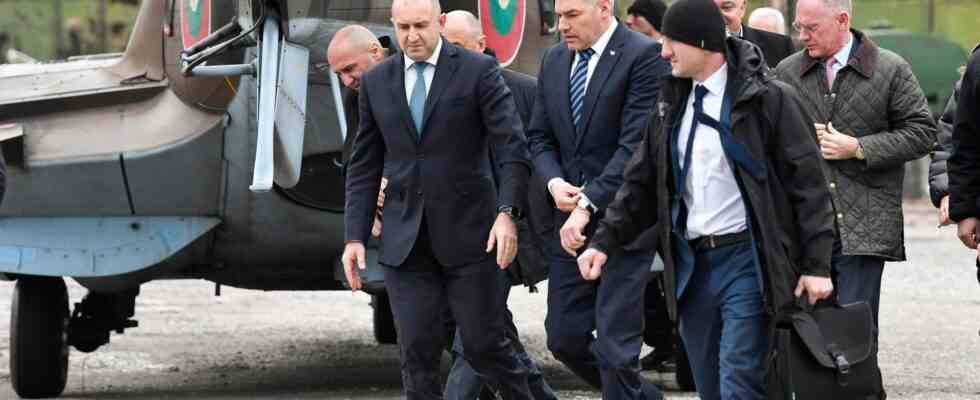Status: 01/26/2023 06:01 a.m
The ongoing political crisis in the country has made President Radev the dominant figure in Bulgaria. Some now wish for a state restructuring of the country with a strong man at the top.
Monday, January 23: An army helicopter flies along the Bulgarian-Turkish border. On board: Bulgarian President Rumen Radev and Austrian Chancellor Karl Nehammer. Radev had invited Nehammer so that the guest could see for himself the quality of Bulgarian border security and in the hope that Austria would soon give up its veto against Bulgaria’s accession to the Schengen area.
The picture with the helicopter is symbolic, because the Bulgarian Prime Minister would actually have shown the border to the visitor. But because Bulgaria has not had a government that can hold office for more than a few months for two years and after four parliamentary elections, the president has switched to the role of regent. As a matter of course, Radev represents Bulgaria at EU level or at the NATO summit with US President Biden.
President in the role of Head of Government
Because of the ongoing political crisis in his country, 59-year-old Radev has become the face of Bulgaria. The former fighter pilot and head of the Bulgarian Air Force has “ruled” virtually since May 2021, using transitional governments that themselves do not have much room for manoeuvre. Although his reputation has fallen from 51 percent to just 36 percent in the past year, Radev is still the most trusted.
Observers explain that his image has recently suffered with his attitude towards Russia and the war in Ukraine. A transitional government, with his blessing, had attempted a rapprochement with the Russian energy company Gazprom. Radev also spoke out against arms deliveries to Ukraine because, in his view, this would mean “putting out a fire with gasoline”.
Campaign to introduce a presidential system
Impressed by the image of the President, political circles in Bulgaria are therefore discussing a possible conversion of the country into a presidential republic. There is sympathy for this, especially in the party with the somewhat unwieldy name “There is such a people” (ITN).
The party is already collecting signatures for a referendum on the introduction of a presidential system. The boss is the entertainer and media entrepreneur Slawi Trifonov, who has lost a lot of the population’s trust himself. The campaign for a presidential system is also seen as an attempt to gain more support.
Majority of people against system change
But the chances of success are likely to be slim. With their experience of 45 years of communist one-man rule until democratization in 1990, the Bulgarians are not very keen on such a system change. The majority of the population supports parliamentary democracy.
The constitutional lawyer Natalia Kiselova therefore expects the presidential campaign to fail and predicts that “they (the ITN party) won’t even be able to collect 200,000 signatures to start a referendum because it’s a complicated procedure and they don’t have a clear idea whatever they are going to propose. It will be doomed.”
The biggest obstacle to a system change might even be President Radew himself. He doesn’t want a presidential system. Possibly also because after two terms in office he is no longer allowed to run for an election.
elections in April
After the last attempt to achieve a stable majority this week failed, Radew has now announced that he will dissolve parliament on February 3 and call new elections for April 2. Observers do not expect clear majorities to emerge. The reasons lie in the division of Bulgarian society.
On the one hand there is long-time Prime Minister Boyko Borissov’s conservative governing party GERB (“Citizens for a European Development in Bulgaria”), which is suspected of corruption. It became the strongest party in the October elections with more than 25 percent of the vote. On the other side is the reform party PP (“We are continuing the change”) of the last prime minister, Kyril Petkov. The PP recently got a little more than 20 percent. But it is still too weak to form a stable government without GERB.
Observers speak of a “dead end”
The situation seems muddled. The political scientist Slawi Wassilew speaks of a broken political dialogue, which is why no movement is possible. According to Vasilev, the country “is clearly heading for a dead end. I am sure that we will find ourselves in the same dead end again in the next early elections”. Elections in autumn 2023 are already being discussed. Then there will also be elections in the communities.
GERB is dominant there and they could speculate that a combination of municipal and general elections will bring them back to power. Observers see a way out in that reformers and conservatives join forces to overcome the blockade.
The analyst Mira Badzhewa advocates a coalition of the reform party PP, the right-wing conservative party DB (“Democratic Bulgaria”) and GERB. But until then, the President will presumably continue to steer Bulgaria’s fortunes.
New elections in Bulgaria
Silke Hahne, ARD Vienna, 24.1.2023 2:51 p.m

